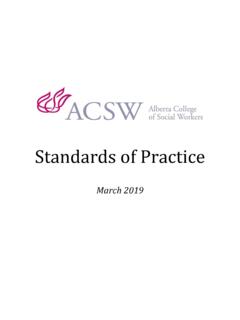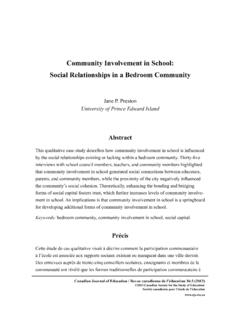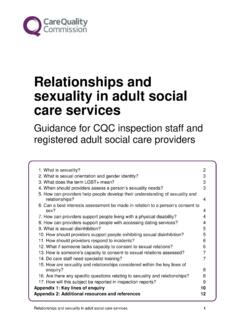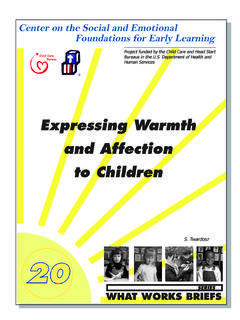Transcription of Honouring Sacred Relationships: Wise Practices in ...
1 Honouring Sacred Relationships: Wise Practices in Indigenous social Work Alberta College of social Workers February 2019 prepared by University nuhelot i nethaiyots i nistameyim kanak Blue Quills for Alberta College of social Workers i Table of Contents Forward Message from ACSW, Indigenous social Work Committee .. 1 Our Context and Collective Journey .. 2 The Indigenous Worldview .. 4 Key Themes Spirituality, Ceremony and Culture .. 6 Relationships: Indigenous culture is based in relationships; we are all related ..9 Colonial Impacts - loss of connection with land, language, kinship, community Contemporary social context of racism and lateral violence Ethical Space: where cultures and worldviews intersect.
2 11 Identity, Lived Experience and Knowing .. 12 Common Experience, shared histories Circles: establishing safe relational space .. 14 Ancient practice with contemporary options to build and rebuild relationships Protocol and Policy .. 17 Cultural responsibilities and relational accountability Lifelong Learning: external and internal ways of knowing .. 19 Becoming an Ally .. 21 Appendix A: A sampling of readings and websites .. 23 REFERENCES .. 27 ii 1 Tansi! Aanii! Oki! Aba watoec! Tawnshi! Edlonat e ! Hello! Looking behind I am filled with gratitude. Looking forward I am filled with vision. Looking upwards I am filled with strength. Looking within I discover peace.
3 - Q ero Indian Teaching As this teaching reminds us, we take time to thank those who have contributed their ancestral wisdom, lived experience, and voice into the development of this resource Indigenous Practice Guidelines - for all social workers in Alberta to use in their work with Indigenous children, youth, families, communities, Settlements and Nations across this province. We also honor those who have previously carried the vision for the creation of this document. The Alberta College of social Workers (ACSW) and the Indigenous social Work Committee (ISWC) have provided countless hours ensuring that we have been inclusive of the diversity of the Indigenous people of Alberta as much as possible.
4 And the complexity of this project could not have been explored as fully as it was without the support of the Minister of Indigenous Relations for Alberta, the Honorable Richard Feehan, who provided leadership for our collective efforts. The Truth and Reconciliation Commission calls on Canadians from all walks of life to take action, with multiple recommendations specific to the work we as social workers are involved with every day. These first step guidelines will assist social workers to build and maintain good relationships that are based on Seven Teachings respect, love, courage, honesty, wisdom, humility, truth. These values are found in most Indigenous belief systems as well as in many spiritual traditions around the world.
5 This document represents the voices of those who have passed, those who walk among us now, and those generations still to come. It is a living document and represents a beginning place to meet the needs of Indigenous people. The ISWC will serve as the caretaker of this document to ensure the highest level of quality is provided to Indigenous people regardless of where they reside in the province. Derek Chewka, MSW, RSW Chair, Indigenous social Work Committee Alberta College of social Workers 2 Gathering Voices This document was initiated and supported through Ceremony to invite the spiritual and lived wisdom of Indigenous and non-Indigenous social workers into a collective process.
6 A literature review was conducted along with personal interviews, talking circles, and students in social work education. Two questions were asked which elicited a great deal of enthusiastic discussion and articulated common themes. The two questions were: 1) what is Indigenous social work practice? and 2) how is that different from conventional or mainstream practice? This document uses the words conventional, contemporary, western or mainstream to refer to paradigms and Practices reflecting a non-Indigenous lens in social work. The words traditional or Indigenous will be used to describe paradigms and Practices reflecting an Indigenous worldview. Indigenous social Work The heart of Indigenous social Work is a relational approach.
7 It is a fine balance to walk between the two worlds of Indigenous and non-Indigenous helpers, and support is needed from all parties involved if we are to do this in a good way. Weaver (2008) states, I take the position that the identity of the social worker is not enough to make social work Indigenous ..Indigenous social work would be to ensure that social work Practices are locally relevant in spite of the fact that social work itself may be borrowed from another culture. This requires us to be mindful and respectful of both worlds and teaches us the importance of relationship building so that all social workers develop wise practice with those they serve. Deepening understanding is the goal.
8 The social Work Context social Workers are everywhere in the province of Alberta. They are Indigenous and non-Indigenous from multiple cultures and working in diverse settings in urban, rural and remote locations. They work in all sectors the fields of health, child protection, community development, justice, education, and more. They are in government, industry, private, profit and non-profit service and work at individual, family, community, regional levels and beyond. The Indigenous People The term Indigenous refers to people who collectively self-identify as having historical continuity with pre-colonial societies and form non-dominant groups within wider nation-states (United Nations, 2016).
9 Indigenous people are diverse and unique to the group or the geographic location with whom they identify whether it is First Nation, Metis, or Inuit descent, and who may or may not have Indigenous status with the Government of Canada. 3 There are three Treaty Territories in Alberta comprised of the Beaver, Blackfoot, Cree, Dene, Nakoda and Salteaux, encompassing the Metis, who are distinct groups with their own worldviews, languages, belief systems, ceremonies and relationship protocols. At the same time, these diverse groups hold an interconnected worldview that provides common ground for understanding and living good relationships among and between people. Indigenous Practice Guidelines This resource is a beginning place to remind you of something you already know or to invite you to learn more.
10 Seven key themes are offered with the understanding that this general information invites further discovery and dialogue through local relationships between social workers and the Indigenous people in their community whether that community is a geographic location or a circle of professional allies. The themes are described though an indigenous lens and are elements of relational practice that are wise Practices everywhere. Each social worker can seek knowledge and explore how this theme is understood and expressed by the Indigenous people who come together with them in relationship . This is a Collective Journey In 2015, Canada s Truth and Reconciliation Commission published 94 Calls to Action.







